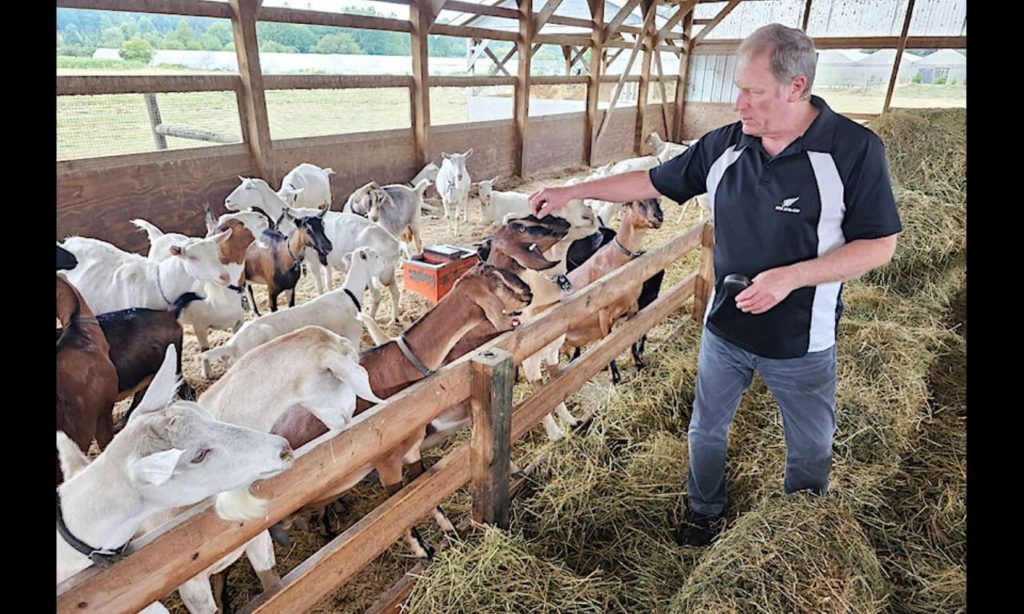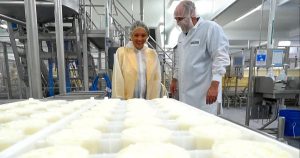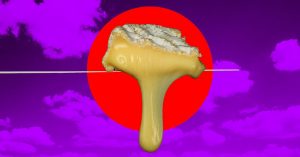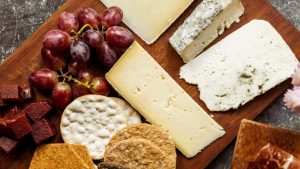
On a sunny weekday morning, Bill Craven got in his car and made his regular drive from his home in Surrey, near the Langley border, to the Milner Valley Cheese’s farmgate shop, a small, tidy one-storey building attached to a 113-year-old farmhouse down a rural lane at 21479 Smith Cres.
It was, Craven felt, well worth the trip.
“I’ve been coming here for probably five or six years on a regular basis,” he explained.
“I just enjoy coming here. Their products are very good, I feel. [My wife and I] enjoy the cheese and their ice cream.”
Glenn and Marianne Smith, who own the shop, along with the goats, and the dairy and cheese-making facility behind it, have a lot of regulars.
“I would say we have the best customers,” Marianne remarked.
“They’re loyal. They come back every week and they pick up their milk, and their eggs [depending on availability] and a piece of cheese or so. We wouldn’t be anything without our loyal customers.”
Some customers come because they have difficulty with cow-milk-based products, and find the goat cheese and other products much easier on their system, Marianne has noticed.
“We didn’t realize when we started, how many people have issues digesting cows’ milk, whereas the goats’ milks tends to be easier to digest for a lot of people. That kind of surprised us.”
Milner Valley Cheese offers artisan goat cheese, and, when the weather is warm, a sideline of sweet gelatos – sometimes served in handmade waffle cones – that offer a richer, smoother texture because they are made with goats milk.
“Not a large variety of flavours,” Marianne explained. “Just about four to six, the basics, and I just make it usually the night before, because you want your flavours to set and settle. And then in the morning, I run it through the ice cream maker. It seems to be popular during the summer months.”
Flavours can include everything from chocolate, to hazelnut, lemon to mango. Coconut, cappuccino, and salted caramel are also popular, as well as the sugar-free raspberry.
Gelatos are a fun sideline, but the main product – the items that keep people coming back – is the cheese, she noted. That includes Goat Feta, Colby-style, easy-slicing Milner Jack, and wine-infused Typsy Goat, to name just a few types.
“As far as hard cheeses go, we basically do Colbys and Jacks,” Marianne elaborated, noting “That’s our main thing. I do make an aged Caerphilly (a Welsh-style hard cheese) and we age it about a year.”
Customers are advised the farm follows the natural cycle of the goats, who only produce milk nine months of the year (from spring to early winter) so the store may not always carry the same selection, and availability will vary throughout the year.
Looking down from the walls of the store, a faded photograph shows John Smith, the first owner of the farm, on his horse, next to pictures of the small house that was first built on the property, and the larger home, still standing, that replaced it.
“The farm has been here since the 1880s” Glenn explained.
“It was a 2,200-acre farm on both sides of Glover Road, to serve the trading post in Fort Langley at the time.”
John Smith bought a section when the family farm was broken up.
“This is just one very small part of that original corporate farm,” Glenn noted.
Glenn grew up in the farmhouse to become the fourth generation of the Smith family running the farm.
An old-fashioned radio, the size of a bar fridge, stands next to the store entrance.
“It was in my bedroom when I was growing up,” Glenn related.
There are now six generations of Smiths, with the arrival of Stevie seven months ago, the first granddaughter for Glenn and Marianne.
Glenn explained the family took up raising goats in 2010 to make cheese after their dairy closed.
“Originally, it was a mixed farm. They had potatoes and hazelnuts and chickens, when I was [being] raised. My dad specialized as a cow dairy farm. We eventually got out of the cows, and it seemed kind of weird not having some animals. So we just got a few goats, and came across the idea of cheese making, and just started to do that.”
Currently they have about 80 goats.
All natural cheeses are handcrafted using their own pasteurized fresh goat milk from the herd, which lives just behind the house – long-eared Nubian and Alpines known for their rich milk quality, along with the pure white Saanen, described as the “Holstein of the herd.”
“They (Saanen) will give a bit more, and the Nubian breed will give a little less, but their milk is richer, higher in milk fat and milk protein and it’s a milk fat and milk protein that we get the cheese yield from,” Glenn explained.
Willow, a 10-year-old alpaca-llama cross with a stern demeanour, lives with the goats as a guard animal, driving off coyotes looking for an easy meal.
And Willow plays favourites, it turns out.
“She likes me, she doesn’t like him,” Marianne laughed.
“She spits at me all the time,” Glenn conceded.
While there are windows and signs to guide visitors on a tour of the farm, the gate to the barn where the goat live stays closed.
“We are not a petting zoo,” Glenn emphasized.
As for what the future holds, Glenn and Marianne both said it is “all about good health,” and with the help of their sons they plan to continue “as long as possible.”
Milner Valley Cheese’s farmgate shop is open April through December, Tuesdays to Saturdays, from 10 a.m. to 5:30 p.m. January, February, and March, the store is closed.






















